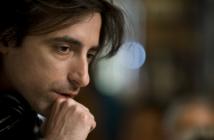
Editor’s Notes: Dragon Girls opens in Toronto on Friday, July 19th.
Inigo Westmeier is a filmmaker’s documentarian, not a journalist with a shakey-cam, but a cameraman, a cinematographer, someone who understands the medium first and his subjects second. I talked to him about his feature debut, an exquisite portrait of young girls training in martial arts at China’s prestigious Shaolin Tagu Kung Fu School.
Watching Dragon Girls, rich in both style in substance, you can almost detect a Westmeier style: elegant crane shots, smooth and precise framing, and generous lighting, natural or otherwise. He first takes a long look at the scene and tries to put himself in the editing room, not shooting for quantity but preparing the frame and waiting for the moment. Born in Brussels and educated in Germany, America, and Russia, Westmeier is a jovial guy, except when it comes to sloppy camerawork.
“I don’t believe in this [idea]that it’s more truthful if you shake the camera around the face,” he complains of his fellow documentarians, “I don’t think it’s more realistic if you jump around with a moving camera. There is no reason not to film those girls nicely!”
Penetrating the natural reserve of the girls and the Shaolin trainers took time and patience. Westmeier found his Chinese subjects less willing to show emotion than his Western subjects. Interestingly, Chimeras director Mika Mattila told me the opposite, but that just goes to show the obvious that China is a very complicated place.
Case in point: is training girls in kung fu is empowering to women from small villages? “If the girls return to their villages, the other kids have a lot of respect for them. The options [for work]in the village are not very good.” Kung fu is an avenue for employment in the military or police forces, or, if you are exceptionally talented, national and international competition.
The hyper-competitiveness in the school (enrolling over 26,000 students) seems to belie the art’s original philosophy. “For the real master, the fight is decided before it begins,” says Inigo, a one-time kung fu student. “They come, they look at each other and they know who will win. So they don’t need to fight. But in the school you need to fight to prove you’re the best.”
During an all-too brief trip back home, nine-year old Chenxi Xin says she will miss her father when she goes back to school, but that she also really wants to go back to school. “This is the big point,” says Westmeier, “the conflict between loving your father, and your new life at the school.”
According to Shaolin monk Shiyan Zhuang, kung fu literally means accumulating great power over a focused period of hard work. Westmeier found that every girl had her own definition of kung fu. “One says kung fu is really hard work, one says it’s just shaking arms and legs. I wanted to show their own opinions and individuality among the masses.”
Finally, I ask him if shooting in China is as difficult as everyone says it is. “Every morning the guide would say what I wanted was impossible, and every morning we did it. Every day we did the impossible.”
His agent, Zhou Xiaoyang of Attraction Distribution, chimes in to suggest that in China, unlike the West, what’s impossible is not always actually impossible. “You can work around the system. For example, Inigo took a photo camera to shoot in Shanghai instead of an HD camera. A real camera would have attracted police, but we worked around it.”
At the Q&A during the film’s premier, one audience member asked Westmeier for his own opinion, which pretty much misses the entire point of a studiously objective film like Dragon Girls. Westmeier wants people to come away with a multi-layered perspective on the academy, the brutal yet caring trainers, and the suffocating and loving expectations of parents. “I didn’t want to put a story on the kids, but to see it at eye-level, through their level.”



